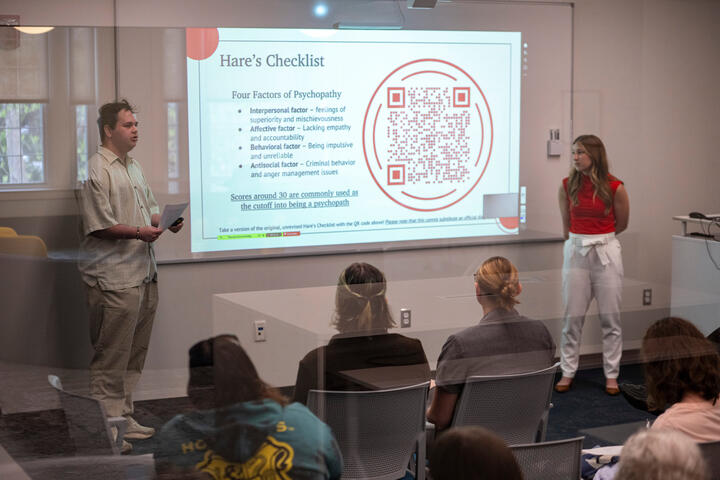
Student Learning Outcomes
At Hood College, we are committed to teaching excellence. Program goals and learning outcomes identify what we expect students to learn, think critically about and accomplish in their courses and programs of study at both the undergraduate and graduate levels. We believe an integrated learning approach that combines a strong grounding in the liberal arts with advanced study in the major and opportunities for internships and research initiatives is the best way to prepare students for lives of purpose and civic engagement.
Graduates earning a bachelor’s degree in art therapy from Hood College:
- Show proficiency in the foundational learning content areas of psychology and studio art.
- Develop working knowledge of the foundational theories and content of developmental psychology.
- Demonstrate working knowledge of the foundational theories and content of abnormal psychology.
- Demonstrate studio art proficiency in two-dimensional art media techniques and processes.
- Demonstrate studio art proficiency in three-dimensional art media techniques and processes.
- Demonstrate familiarity with the major concepts, theoretical perspectives, techniques, and historical trends in art therapy.
- Describe key concepts, principles, historical trends, and overarching themes in art therapy.
- Distinguish among the therapeutic benefits of various art processes and media, strategies, and interventions as well as their applicability to treatment for individuals, groups, and/or families.
- Understand and apply the ethical principles and professional codes of practice for art therapists as they apply to clinical practice, communities, and self.
- Show understanding of the ethical principles and professional codes of practice for art therapists.
- Recognize the legal, ethical, and cultural considerations required for conducting art therapy research.
- Recognize that art therapy uses a multicultural perspective and considers how specific values, beliefs, and actions are influenced by a client’s race, ethnicity, nationality, gender, religion, socioeconomic status, political views, sexual orientation, geographic region, physical capacity or disability, and historical or current experiences within the dominant culture.
- Recognize and show working knowledge of the use of imagery, creativity, symbolism, and metaphor to express challenges and strengths as well as promote growth and well-being.
- Demonstrate knowledge of the principles of human development, artistic and creative development, human sexuality, gender identity development, family life cycle, and psychopathology to the assessment and treatment of clients.
- Articulate clinical theory and applied practice through written and oral communication across broad interdisciplinary communities.
- Comprehend and apply creative and aesthetic processes in the context of creative arts therapy theory and practice. (ARTT 399, Art Therapy Internship, End-of-Semester Reflection)
Graduates earning a bachelor’s degree in psychology from Hood College:
Goal 1: Content Knowledge and Applications
1.1 Describe key concepts, principles, and theories in psychological science
1.2 Develop a working knowledge of psychology’s major subfields
1.3 Portray significant aspects of the history of psychological science
1.4 Apply psychological content to solve practical problems
1.5 Provide examples of psychology’s integrative themes
Goal 2: Scientific Inquiry and Critical Thinking
2.1 Exercise scientific reasoning to investigate psychological phenomena
2.2 Interpret, design, and evaluate psychological research
2.3 Incorporate sociocultural factors in scientific research practices
2.4 Use statistics to evaluate quantitative research findings
Goal 3: Values in Psychological Science
3.1 Employ ethical standards in research, practice, and academic contexts
3.2 Develop and practice interpersonal and intercultural responsiveness
3.3 Apply psychological principles to strengthen community and improve quality of life
Goal 4: Communication, Psychological Literacy, and Technology Skills
4.1 Interact effectively with others
4.2 Write and present effectively for different purposes
4.3 Provide evidence of psychological literacy
4.4 Exhibit appropriate technological skills to improve communication
Goal 5: Personal and Professional Development
5.1 Exhibit effective self-regulation
5.2 Refine project management skills
5.3 Display effective judgment in professional interactions
5.4 Cultivate workforce collaboration skills
5.5 Demonstrate appropriate workforce technological skills
5.6 Develop direction for life after graduation
Are you ready to say Hello?
Choose a Pathway
Information will vary based on program level. Select a path to find the information you're looking for!
